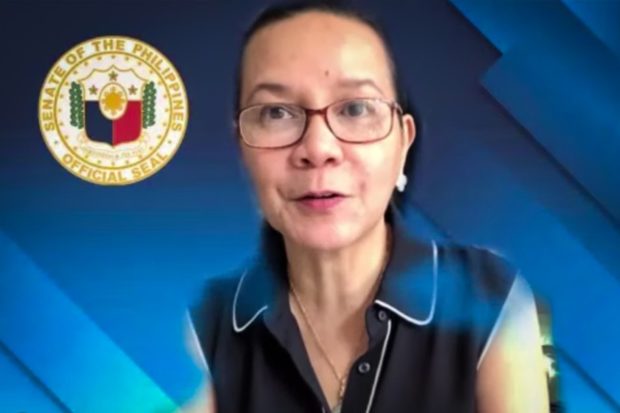Don’t resort to ‘shock and awe’ tactics during lockdowns, Poe urges mayors

Sen. Grace Poe (Photo from the Senate Public RIB)
MANILA, Philippines — The chair of the Senate public services committee on Wednesday cautioned mayors and governors poised to enforce granular lockdowns not to resort to a “shock and awe” method of restricting movements and sealing off high-risk areas.
Sen. Grace Poe issued an appeal to local governments to give their constituents ample warning before locking down areas identified to have a clustering of COVID-19 cases in their communities.
The senator said prior notice would allow residents to stock up on food, medicine, water and other essentials in spite of expectation of coming aid from the local and national government.
“Working members of the family should also be given time to return home and inform their offices or workplace of their expected absence so their jobs will not be put at risk,” Poe said.
“Lockdowns can be used as means to save lives without killing livelihoods and further inflicting suffering on our people,” she said.
Article continues after this advertisementSurprise inspections
Parañaque City Mayor Edwin Olivarez, chair of the Metro Manila Council, said local officials were ready to enforce the new guidelines on alert levels and granular lockdowns.
Article continues after this advertisement“The guidelines given to us are nearly the same as our quarantine protocols since we’re [on modified enhanced community quarantine]. But what’s good now is there’s a reopening of the economy by allowing restaurants [and personal care services] to operate on limited capacity,” Olivarez said at the televised Laging Handa public briefing on Wednesday.
Olivarez said business permits and licensing office personnel, together with policemen and barangay authorities, would be conducting surprise inspections of establishments and worship places to monitor their compliance with venue capacity limitations, vaccination requirements and observance of minimum public health protocols.
He said that while Metro Manila mayors have agreed on the uniform guidelines provided by the interior department, each local government unit (LGU) would retain the discretion on the size of the areas that would be locked down.
The mayor said that instead of cordoning off entire subdivisions or barangays, local governments might lock down smaller areas with a high number or clustering of COVID-19 cases, such as one house, a single floor of or a whole condominium building, or just an entire street.
He said Metro Manila LGUs were finishing their information drive in barangays, commercial areas and parishes for the proper implementation of the new guidelines.
He said lockdowns would last up to 14 days with government health personnel authorized to subject everyone to contact tracing and testing, and to isolate suspected or confirmed cases.
He noted that testing would not take long considering that many local governments in Metro Manila, including Parañaque, have their own molecular testing laboratories.
The local governments would provide food assistance to residents under lockdown in the first week, while the social welfare department would provide the aid in the second week, Olivarez added.
Pasay City Mayor Emi Calixto-Rubiano on Wednesday said she supported the alert level 4 quarantine classification in the city, adding they would not have a hard time in adopting the new scheme because of the city’s experience in carrying out the system.
Pasay City implemented granular lockdowns as early as March, according to Jun Burgos, the city’s public information officer. He said this helped bring down the number of active COVID-19 cases in the area by July.
Cash aid needed
Meanwhile, a private think tank questioned if the government was indeed making its decisions based on science and data, after the Duterte administration decided to reopen some businesses in Metro Manila despite the red flags raised by overwhelmed health-care workers and the worsening outbreak.
The Action for Economic Reforms (AER) said in a statement on Tuesday that the government should impose stricter quarantine measures and learn from its past missteps by providing enough support for the poor and unemployed so they would stay home.
“Government’s responsibility is to provide relief and social protection, and not to expose people from getting sick or from dying,” AER said.
For people to fully comply with the lockdown rules, it said the government must provide cash aid for the poor, the hungry and the unemployed.
“Easing mobility when cases continue to surge amid a crumbling health system will also lead to economic disruption, but with greater costs,” AER added.
It said the Inter-Agency Task Force for the Management of Emerging Infectious Diseases has to be self-critical and reexamine its strategy and beyond the fact that it flip-flops on decisions regarding quarantine measures, the real issue was whether or not it was making sound decisions based on the data and the science.
“Easing up during a time when cases continue to rise at an alarming level (over 26,000 a day) and when health facilities are overstretched and health workers are exhausted is not sound at all,” AER said in its Sept. 14 statement.
“Our lockdowns have had limited effectiveness because they are porous and they are not accompanied by increased human health resources, testing, contact tracing, quarantine facilities, medicines and supplies, and relief for the hungry and unemployed,” AER said. —With reports from ROY STEPHEN C. CANIVEL AND JANE BAUTISTA
For more news about the novel coronavirus click here.
What you need to know about Coronavirus.
For more information on COVID-19, call the DOH Hotline: (02) 86517800 local 1149/1150.
The Inquirer Foundation supports our healthcare frontliners and is still accepting cash donations to be deposited at Banco de Oro (BDO) current account #007960018860 or donate through PayMaya using this link.